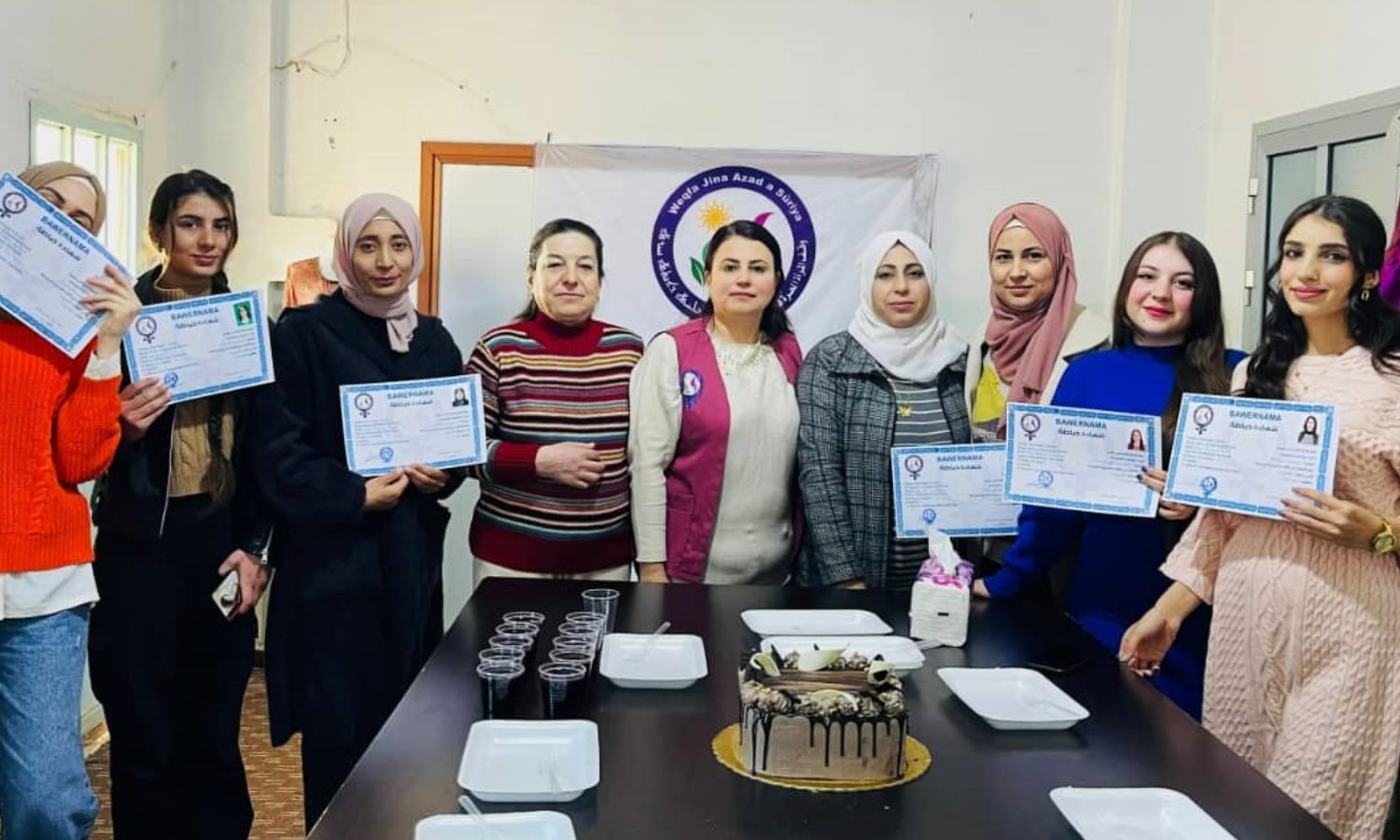



Al-Hasakah – Majd al-Salem
Aisha Mahmoud (33 years old) tried to practice teaching in rural al-Hasakah province in eastern Syria because she holds a degree from the Women’s Arts Institute, but she was unsuccessful, as job opportunities are “almost non-existent, especially for women,” she said.
Encouraged by her husband, who works in daily labor, Aisha enrolled in a training course at a beauty center in Qamishli to learn the “art of nail design,” which is popular among young women, and she loved this profession.
Despite the difficulty of finding a place to open her own center, she bought a set of tools and materials to start working from home, and began promoting her work through WhatsApp groups. She gained several clients and sometimes visits them in their homes, receiving positive feedback from most of them.
In light of the deteriorating economic conditions that many families in al-Hasakah are experiencing, women in the region are striving to find job opportunities to help themselves and their husbands bear the burdens of family expenses.
In her conversation with Enab Baladi, Aisha described her income as “very good,” and better than 150,000 Syrian pounds (14 USD) for teaching. She earns 75,000 Syrian pounds (7 USD) for each nail design session.
With the offers Aisha provides, especially during holidays and other occasions, she, with the help of her husband, secures an income that covers most of what her family of four needs.
Hana al-Hamid (36 years old) from Qamishli decided to start her own project making handmade bags for women at home. She told Enab Baladi that the project is not just an additional source of income to meet her family’s needs but also a way to express her creativity.
Hana started the project by purchasing some basic tools such as fabric pieces, thread, needles, zippers, and some decorations like buttons and beads.
Despite the challenges she mentioned, such as the availability of ready-made bags at low prices and difficulty reaching customers initially, she overcame this with help from her friends and by using social media.
Hana sells each bag for between 20,000 and 30,000 Syrian pounds, and some for 50,000 depending on the size, considering her project a success, evidenced by the fact that some customers return to buy more and ask for special designs.
Several organizations in al-Hasakah work to support women and offer training courses to teach skills, including the Khair organization, which implements several free training courses in various fields, some of which focus on empowering women to face economic challenges.
An employee at the organization (who requested anonymity as she is not authorized to speak to the media) told Enab Baladi that the organization has offered dozens of courses that help women secure a “suitable and independent” source of income.
Among these courses are sewing, embroidery, hairdressing, food preservation, drying, and pickling, as well as marketing and selling food and first aid and nursing courses.
She noted that the turnout from women in the region is “very good,” and that the organization sometimes has to apologize “due to excess numbers,” with some women actually starting their own projects, such as women’s sewing.
She added that the main issue lies in the lack of provided support, as the organization’s role, like many other organizations, is limited to providing vocational training courses without any financial or material support such as equipment or devices.
The employee pointed out that the male population in the area suffers from unemployment, which is doubled for women, especially uneducated women, and the situation worsens for women in camps.
According to what Enab Baladi observed, most organizations focusing on women’s issues in the region are limited to awareness-raising and vocational training, with little to no financial or material support available.
For years, women have engaged in dangerous and difficult jobs unsuitable for their physical conditions, such as porterage, where some of the weights they carry reach 25 kilograms, and in some cases, they are forced to climb stairs with these heavy loads.
Furthermore, there is currently no women’s labor union in northeastern Syria in general and particularly in the city of Qamishli. Women workers do not have any health cards or procedures that could alleviate their treatment costs. There is no complaint center for them in case of exploitation, despite the presence of unions and groups advocating for women’s rights.
if you think the article contain wrong information or you have additional details Send Correction